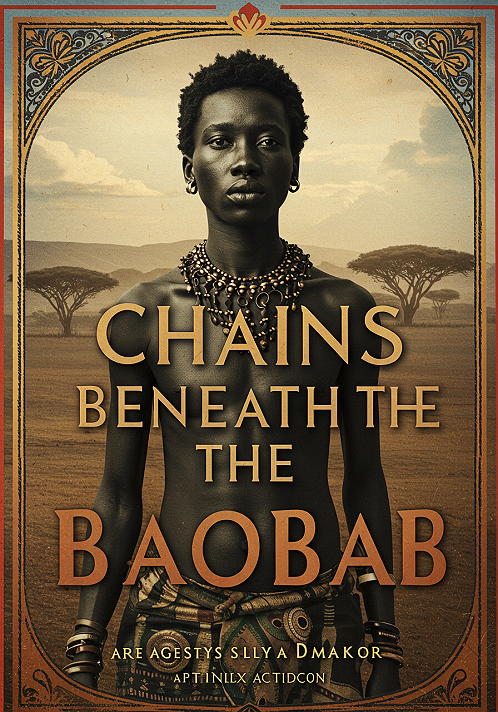CHAINS BENEATH THE BAOBAB
In the 18th century, in a lush village near the coast of present-day Ghana, a boy named Kojo Badu was born beneath the great Baobab tree, where generations of his ancestors had passed down stories and wisdom.
Kojo’s village, Adansi, was a peaceful one—famed for its drummers, sculptors, and philosophers. Every evening, fires lit the air with stories of Anansi the Spider, of sky gods, of warriors who turned rivers into shields. But a shadow was creeping toward them, carried on ships with sails like teeth.
The Atlantic slave trade had reached their shores.
One night, while Kojo slept under the stars with his little sister Ama, armed raiders—led by both foreign invaders and African collaborators—descended. Fires devoured homes. Screams cracked the sky. Kojo and Ama were captured, shackled alongside others, and marched for days to the coast.
There, he first saw the Cape Coast Castle, a towering white fortress by the sea—beautiful from afar, monstrous within. The dungeons were dark, wet, and suffocating. In the bowels of the castle, Kojo etched marks into the stone—one for each day he lived. He was 14.
Ama, only 9, fell ill. Kojo tried to sing her lullabies their mother once sang, but the ocean drowned his voice. She died in his arms three days before they were herded through the Door of No Return.
On the ship, Kojo swore he would survive. Not just to live, but to remember.
The voyage was a nightmare of chains, hunger, disease, and death. Kojo made it to the sugar plantations of Jamaica. But something inside him remained rooted in Adansi. Every morning before sunrise, he would whisper stories of his homeland to others. He taught them the drum rhythms of his people. He taught children the proverbs his grandmother taught him.
He refused to forget.
Years later, during the First Maroon War, Kojo escaped into the mountains and joined the resistance. There, he became known as Kojo the Baobab, a man whose memory ran so deep, they said even the trees bowed to him.
He lived to see a treaty signed, granting freedom to his rebel community. Though he never returned to Africa, he planted a baobab seed in the heart of the Blue Mountains.
“This tree,” he said, “will grow with the stories of all we lost—and all we saved.”
Today, travelers in Jamaica still visit the massive baobab tree said to be descended from Kojo’s. It is adorned with cloth, beads, and carvings from across the Black diaspora.
On the wind, they say, you can still hear him whispering:
"We were never just slaves. We were stolen kings, buried seeds, and still—we rise." #AfricansStorytelling
In the 18th century, in a lush village near the coast of present-day Ghana, a boy named Kojo Badu was born beneath the great Baobab tree, where generations of his ancestors had passed down stories and wisdom.
Kojo’s village, Adansi, was a peaceful one—famed for its drummers, sculptors, and philosophers. Every evening, fires lit the air with stories of Anansi the Spider, of sky gods, of warriors who turned rivers into shields. But a shadow was creeping toward them, carried on ships with sails like teeth.
The Atlantic slave trade had reached their shores.
One night, while Kojo slept under the stars with his little sister Ama, armed raiders—led by both foreign invaders and African collaborators—descended. Fires devoured homes. Screams cracked the sky. Kojo and Ama were captured, shackled alongside others, and marched for days to the coast.
There, he first saw the Cape Coast Castle, a towering white fortress by the sea—beautiful from afar, monstrous within. The dungeons were dark, wet, and suffocating. In the bowels of the castle, Kojo etched marks into the stone—one for each day he lived. He was 14.
Ama, only 9, fell ill. Kojo tried to sing her lullabies their mother once sang, but the ocean drowned his voice. She died in his arms three days before they were herded through the Door of No Return.
On the ship, Kojo swore he would survive. Not just to live, but to remember.
The voyage was a nightmare of chains, hunger, disease, and death. Kojo made it to the sugar plantations of Jamaica. But something inside him remained rooted in Adansi. Every morning before sunrise, he would whisper stories of his homeland to others. He taught them the drum rhythms of his people. He taught children the proverbs his grandmother taught him.
He refused to forget.
Years later, during the First Maroon War, Kojo escaped into the mountains and joined the resistance. There, he became known as Kojo the Baobab, a man whose memory ran so deep, they said even the trees bowed to him.
He lived to see a treaty signed, granting freedom to his rebel community. Though he never returned to Africa, he planted a baobab seed in the heart of the Blue Mountains.
“This tree,” he said, “will grow with the stories of all we lost—and all we saved.”
Today, travelers in Jamaica still visit the massive baobab tree said to be descended from Kojo’s. It is adorned with cloth, beads, and carvings from across the Black diaspora.
On the wind, they say, you can still hear him whispering:
"We were never just slaves. We were stolen kings, buried seeds, and still—we rise." #AfricansStorytelling
Topic Live















